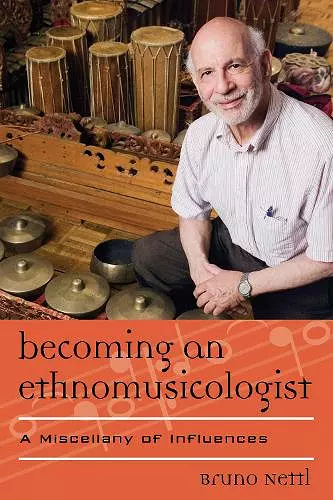Becoming an Ethnomusicologist
A Miscellany of Influences
Format:Hardback
Publisher:Scarecrow Press
Published:4th Apr '13
Currently unavailable, and unfortunately no date known when it will be back

Becoming an Ethnomusicologist centers on the life and education of the author, Bruno Nettl, a well-known ethnomusicologist. Focusing on eleven individuals who influenced him significantly, it follows their roles through his career from his childhood in Czechoslovakia and his family's forced departure in 1939 to his education in the United States and career as a scholar. These essays contribute to an understanding of the life of Jewish and German minorities in Bohemia through the first half of the 20th century, of pre-World War II Prague, of the experience of intellectual and academic refugees in the United States during and after World War II, and of the early development of ethnomusicology as a field of study.
This work opens with the author's exploration of the careers of his father, the well-known music historian Paul Nettl, and his mother, Gertrud Nettl, a pianist and piano teacher. From his boyhood in Prague, Nettl provides insights into his own evolution as a musicologist.He discusses the rise of the discipline of ethnomusicology, from the studies of Native American music by his mentor George Herzog to the work of linguist C. F. Voegelin and folklorist Stith Thompson.He also looks back on the contribution and input of his principal consultants in his fieldwork on Native American, Iranian, and Indian music.
These essays contribute significantly to the history of musicology, containing the longest--to date--treatments of the contributions of the distinguished scholars Paul Nettl and George Herzog. This work will interest students and scholars of immigration history, Native American culture, and the history of ethnomusicology itself.
Among the highlights of Becoming an Ethnomusicologist are its evocative accounts of pre-World War II Prague, postwar Bloomington, and the international network of comparative musicologists, anthropologists, and folklorists engaged in research on forms of traditional music during the first half of the twentieth century. This network provided a foundation for the institutionalization and growth of North American ethnomusicology after 1950 and was the milieu for the development of Nettl’s own distinguished career. ... In this wonderful book, we learn not only about the substantial impact of European scholars on ethnomusicology in the U.S. but also how musicians and researchers throughout the world have collectively constructed this field of knowledge. At the same time, we gain many insights on the life and work of Nettl himself, who has done so much to build this field over the past half-century through his many publications, teaching at the University of Illinois, and service to the Society for Ethnomusicology and other organizations. This book is highly recommended to practitioners of ethnomusicology, historical musicology, folkloristics, linguistics, and anthropology—all fields that have been embraced and synthesized by Nettl in his exceptional career. * Journal of Folklore Research *
ISBN: 9780810886971
Dimensions: 235mm x 161mm x 22mm
Weight: 458g
240 pages